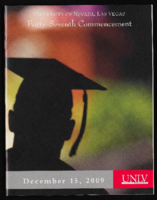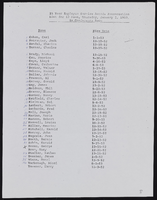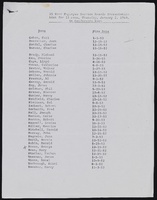Search the Special Collections and Archives Portal
Search Results

University of Nevada, Las Vegas (UNLV) 47th commencement program
Date
Archival Collection
Description
Commencement program from University of Nevada, Las Vegas Commencement Programs and Graduation Lists (UA-00115).
Text

Miguel Villarba oral history interview: transcript
Date
Archival Collection
Description
Oral history interview with Miguel Villarba conducted by David Islas on December 6, 2021 for Reflections: The Las Vegas Asian American and Pacific Islander Oral History Project. In this interview, Miguel Villarba shares his family's history growing up in Manila, Philippines and immigrating to the United States in 2016. He talks about first living in Chattanooga, Tennessee before moving to Las Vegas, Nevada to be near family when Miguel was in high school. Miguel Villarba shares stories of his grandfather's farm in Pangasinan, Philippines, the differences in city and town life across Manila, Chattanooga, and Las Vegas, and his educational plans. He also talks about Filipino culture and traditions, and racial discrimination.
Text

Transcript of interview with Ronald Simone by Claytee White, May 5, 2009
Date
Archival Collection
Description
Musician Ronald Simone of Las Vegas credits his father’s guidance and his upbringing in New Haven, Connecticut, for shaping his musical and educational aspirations. Due to its proximity to New York City and the influence of Yale University, New Haven offered its residents the finest in musical entertainment; as a result, many musical greats were from or had lived in New Haven and most Broadway shows opened at New Haven’s Shubert Theater. Born in 1935 with the gift of perfect pitch, Simone began to play the piano at a young age and could play most pieces by ear. He began playing professionally at age eight in 1943 with a weekly stint on a radio show, Kitty's Revue. Still in grade school during World War II he began touring locally with an amateur producer, who formed a show that played military bases and hospitals around Connecticut and into New York and Massachusetts. In high school Simone formed his own trio and a quartet and played piano in gin mills, illegal card rooms, and resorts in upstate New York while playing trumpet in the high school band. He joined the Musicians Union at 18 and continued to play in New York and Connecticut clubs and theaters throughout his five years at Yale. During his second year at Yale the School of Music became a graduate school, from which Ron graduated in 1958. Ron’s sister Louise married one of his Yale classmates, a drummer, and the couple moved to Las Vegas. Ron visited his sister in 1959, loved the musical opportunities he saw, transferred his Musicians Union membership, and moved to Las Vegas with his friend, violinist Joe Mack, in September 1960. After sub work and playing a lounge show at the Riviera, he spent five and a half years in the Riviera showroom, moving in 1966 to the Desert Inn, where he played piano in the exclusive Monte Carlo Room for five years for the likes of Dean Martin, Sandy Koufax, Sammy Davis Jr., and Kirk Kerkorian. From there Simone went to the Dunes, where he remained for the next nineteen years working with choreographer Ronnie Lewis and rehearsing and playing all the Casino de Paris shows, line numbers, and production numbers. In July 1989, Musicians Local 369 went on strike. Because Simone was playing the Follies Bergere at the Tropicana—the first house band to strike—he was among the first musicians to walk out. Musicians at all but three Strip hotels (Circus Circus, Riviera, and the Stardust) followed. While the musicians strike lasted nearly eight months, Simone was recruited for sanctioned sub work for the duration at the Lido de Paris show at the Stardust. After the strike ended he worked with Johnny Haig's relief band playing six nights a week at various hotels.
Text

Transcript of interview with Judy Lee (Johnson) Jones by Claytee D. White, February 22, 2007
Date
Archival Collection
Description
In the 1950s and 1960s, the Copa Room at the Sands Hotel and Casino featured glamorous showgirls. For a few years, the Houston Chronicle sponsored a contest that added the Texas Copa Girls to the line. In 1958, one of the winners was 17-year-old Judith Lee Johnson. For the "wild" but "naive" Judy, the experience was a period of funfilled freedom, followed by relentless encouragement of others to attend college, which she reluctantly did. To her surprise, she embraced the college life, took her studies seriously, and received an education degree. She also became Miss Houston. Four years later she returned to Las Vegas and the Sands. As she stepped into her role as a showgirl this second time, she was no longer the newbie. She experiences the lifestyle with more maturity. She talks about the celebrities she met, the lasting friendships she formed, performing in the Elvis movie Viva Las Vegas, and her trip around the world, a trip that included her personal dream of going to Paris. Judy shares details of her family heritage and she wonders to what extent she might have been living her mother's dream. Though her love of performance and theatre is keen, Judy channeled her passions into a 29-year career as an educator. She married a Marine in 1965, raised their children, moved with his career. She and her husband, Walter F. Jones, live in Virginia.
Text

Sook-ja Kim, February 12, 1996 and April 6, 1996: transcript
Date
Archival Collection
Description
The Kim Sisters, composed of three sisters, Sook-ja, Ai-ja, and Mia, came from Korea to Las Vegas in February 1959. Their first contract in America was to perform at the Thunderbird Hotel for four weeks as part of the China Doll Revue, the main showroom program. This engagement led to a successful career. Their popularity reached was at its height at the end of the 1960s when they performed throughout the United States and Europe. Sook-ja Kim is the oldest of the sisters. After his sister Ai-ja died in 1987, Sook-ja teamed up with her two brothers and continued to perform until 1989. Now semi-retired from show business, with occasional performances in Korea, she is working as a real estate agent. In this interview, she talked about her childhood, her career, and the family she has built since coming to America. Sook-ja was born in 1941 in Seoul, Korea as the third child of seven in a musical family. Her father was a conductor and her mother, a popular singer. After the Korean War, her mother arranged to send the Kim Sisters to America. When they came to Las Vegas, there were virtually no Koreans in the area. They depended on each other to take care of themselves. Some of the difficulties they had to adjust to in American were language, food, and cultural differences. Over the span of almost forty years in America, Sook-ja became acculturated without discarding her ethnic identity of family priorities. Her life-long guiding principle has been to adopt certain American values while continuing to keep her cherished Korean ethnic values. Through their performances, the Kim Sister informed the audience about Koreans and their culture. As the oldest of the group, Sook-ja was entrusted the care of her sisters, and later her brothers, the Kim brothers. Once she settled in Las Vegas, she brought more than forty members of her extended family to the city, contributing to the growth of the Las Vegas Korean community.
Text





